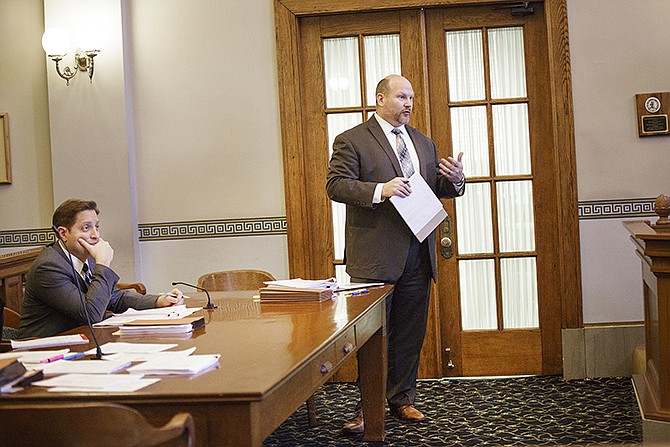Parts of last year's law changing the way Missouri's municipal courts operate actually violate the state Constitution - and Cole Circuit Judge Jon Beetem should block them, a lawyer for a dozen St. Louis County towns told Beetem Friday.
The law went into effect Jan. 1.
At the end of Friday's two-hour hearing, Beetem asked attorneys on both sides to submit their proposed orders in the case within 15 days.
David Pittinsky, a Philadelphia lawyer representing the 12 towns and two of their mayors, told Beetem: "We're not challenging the entirety of (the law), just certain provisions."
For starters, he argued, it's a special law because it "targets only St. Louis County and the municipalities in St. Louis County."
Before the end of 2015, state law said all Missouri municipalities could take in up to 30 percent of their annual general operating revenues from fines, bond forfeitures and court costs related to minor traffic violations.
That 1995 law was written to prevent towns like Macks Creek from getting most of their income from speeding tickets.
But, as officials investigated complaints following the unrest caused by Michael Brown's death in Ferguson in August 2014, they determined a number of St. Louis County communities' municipal courts were taking in a lot of money from traffic fines.
So last year's law reduced the old 30 percent revenue limit to 20 percent statewide, and to only 12.5 percent for the municipalities in "any county with a charter form of government and with more than 950,000 inhabitants."
Pittinsky argued - in the original, 26-page lawsuit filed Nov. 19 and in Friday's hearing - only St. Louis County fits that description, and it likely will be about 75 years before Jackson County, the second-largest Missouri county at around 675,000 residents, comes close to reaching the population level defined by the court reform law.
But Assistant Attorney General Andrew Hirth told Beetem: "The fact that it applies to only one county doesn't mean it applies to only one political subdivision.
"There are 90 some-odd political subdivisions (towns) in St. Louis County, so (the law) applies to far more than one."
And, because county populations can grow, Hirth said, the law could apply to other Missouri counties in the future, so it's not a special law violating the Constitution.
In addition to the lower revenue ceiling, Pittinsky told Beetem, the law requires additional reporting requirements only for the St. Louis County communities - and said they must either have a police department that is accredited, or contract with a neighboring town whose police are accredited.
Charles Wolf - Hazelwood's police chief from 1985 until he retired in 2012, who now runs a firm that helps local department operations - told Beetem it takes one to three years to prepare for the accrediting process and another three years to undergo accreditation from the Commission on Accreditation for Law Enforcement Agencies (CALEA).
"It's a management tool that allows a chief to ensure that he has the most professional policies and provides the best services for the community," Wolf told the court.
Once accredited, a law agency must keep the certification current, including occasional on-site inspections, he said.
"If they find any non-compliance, you're required to fix those before you go to next year's accreditation," Wolf said.
Before the new law, communities could choose whether or not to have accredited law enforcement, but now, it's required.
Wolf said CALEA accreditation costs about $8,700 to start, plus an annual cost around $3,400.
Using Missouri's Police Chief standards for accreditation is cheaper - but still around $5,000 every three years.
Pittinsky argued the costs of the additional reporting requirements and law enforcement accreditation violate the Constitution's 1980 Hancock Amendment, which requires the state to pay when it adds new work for local governments to do.
Hirth countered many communities now do more than they're required by state law, so they could adjust their operations to accommodate new state requirements.
And, even if Beetem accepts the lawsuit's argument that the additional reporting could cost each community up to $500 more a year, Hirth said, "We're talking about a multi-million dollar budget for each municipality and, at most, a $500 piece of paper.
"I think we're a little incredulous at the actual cost of that."
Hirth said Beetem should reject Pittinsky's requests to block the new law's provisions and uphold the Legislature's changes from last year.

